新视野第三册答案
Unit 1
Section A. The Expensive Fantasy of Lord Williams
《读写教程 III》: Ex. II, p. 9
1. Because this is a title bought with stole
2. It’s small, with a population of only 320
3. No. He looks like a Scottish noble, soft-
4. The truth is that the man with endless mo
5. He stole more than eight million pounds o
6. Most of the stolen money was supposed to
7. He used the money to buy an estate, a bea
8. His bank deposits were so large that they
9. Because in the eyes of some villagers Wil
10. He said in an interview after he was arreste
《读写教程 Ⅲ》: Ex. Ⅲ, p. 9
1. suspicion
2. restored
3. considerate
4. inherited
5. furnish
6. justify
7. substantial
8. fantastic
《读写教程 Ⅲ》: Ex. Ⅳ, p. 10
1. To his embarrassment he discovered
2. like that
3. strike deals with
4. live it out
5. falls upon dark days
6. nothing but
7. captured the heart of the little boy with
8. raise a glass to
《读写教程 Ⅲ》: Ex. Ⅴ, p. 10
1. economy
2. business
3. campaign
4. poll
5. survey
6. research
7. lessons
8. study
《读写教程 III》: Ex. VI, p. 11
1. well-advised (明智的)
2. narrow-minded (心胸狭窄的)
3. wide-eyed (眼睛睁大的)
4. soft-spoken (说话温和的)
5. big-headed (妄自尊大的)
6. single-minded (专心致志的)
7. well-meant (用意良好的)
8. quick-tempered (易怒的)
《读写教程 III》: Ex. VII, p. 11
1. air-conditioned
2. handmade
3. thunder-struck
4. heart-felt
5. data-based
6. self-employed
7. custom-built
8. weather-beaten
《读写教程 Ⅲ》: Ex. VIII, p. 12
1. Well-meant as it was, the decision spoile
2. Hard as he tried, he failed to deceive th
3. Poor as he was, she gave up the idea to m
4. Friendly as he may seem, I won’t regard h
5. Suspicious as she was of him, she never c
《读写教程 Ⅲ》: Ex. Ⅸ., p. 12
1. Now (that) you have studied the above mod
2. Now (that) I’ve heard the music, I unders
3. Now that the hotel is beautifully restore
4. Now that the criminal turned out to be on
5. Now that you have got an MA degree, you a
《读写教程 Ⅲ》: Ex. Ⅹ, p. 13
1. My thanks go to those who still stuck by
2. Now that he has published a popular novel
3. The police said that their suspicions wer
4. How can you talk to her like that? She is
5. Hard as the road for these students after
6. In order to have enough money to run the
7. He is fully justified in criticizing the
8. These ancient buildings which are under p
《读写教程 III》: Ex. XI, p. 13
1. 周六晚,在“牢骚酒吧”,村民依旧乐意向 “威廉斯勋爵”祝酒,尽管这个头衔现在只能引
2. 这个美丽的村庄坐落在苏格兰山区中,有一些村民说,他们从来不很了解安东尼
Unit 3
Section A. Where Principles Come First
《读写教程 III》: Ex. II, p. 69
1. It operates on the principle that if you
2. It is famous for its work with troubled y
3. Because teachers protested the program’s
4. The community feared the school would att
5. In the Hyde School, all students are requ
6. Parents must agree to accept and demonstr
7. The biggest obstacle for many parents is
8. Faculty evaluations are conducted by the
《读写教程 Ⅲ》: Ex. Ⅲ, p. 69
1. cultivate
2. comprehensive
3. controversial
4. suspend
5. strain
6. preliminary
7. conventional
8. reform
《读写教程 Ⅲ》: Ex. Ⅳ, p. 70
1. His girlfriend’s father saw him as a man
2. The course was cancelled over the student
3. The problem is so difficult that we canno
4. Children tend to do their utmost when the
5. The new teaching program didn’t work well
6. I was kind of excited when I received the
7. The school is scheduled to open on Septem
8. They appeared to offer a free lunch, comp
《读写教程 Ⅲ》: Ex. Ⅴ, p. 70
1. insights
2. attention
3. recognition
4. entrance
5. control
6. acceptance
7. speed
8. weight
《读写教程 Ⅲ》: Ex. Ⅵ, p. 71
1. historic
2. atomic
3. Arabic
4. energetic
5. economic
6. heroic
《读写教程 Ⅲ》: Ex. VII, p. 71
1. responsibility
2. rapidity
3. elasticity
4. curiosity
5. publicity
《读写教程 Ⅲ》: Ex. VIII, p. 72
1. In Britain, as in America, there is a gre
2. In Greece, as in Italy, people use a lot
3. As in the Hyde School, values such as cou
4. In China, as in Japan, a large number of
5. As in the middle of the 1950s, many young
《读写教程 Ⅲ》: Ex. Ⅸ, p. 73
1. Once you’ve practiced a bit, you’ll find
2. Once the meal was finished, the discussio
3. Once you show any fear, he will attack yo
4. The decision took about 10 seconds once h
5. Once customers come to rely on these syst
《读写教程 Ⅲ》: Ex. Ⅹ, p. 73
1. Our school operates on the principle that
2. The new teaching program was suspended la
3. We see ourselves as preparing our student
4. The basis of the Character First idea is
5. We were warned by the teacher in the firs
6. Once parents agree in writing to accept a
7. In the Hyde School greater attention is p
8. The school stresses the idea that it is w
《读写教程 III》: Ex. XI, p. 73
1. 该校的创始人约瑟夫
Unit 5 、Section A. Graceful Hands
《读写教程 Ⅲ 》: Ex. II, p. 130
1. The writer gets to know it from Mrs. Clar
2. Maybe it is because the idea of Mrs. Clar
3. The writer wants to show us a true-to-lif
4. Because she doesn’t have enough strength
5. Because she didn’t want them to suffer fr
6. She means that they both realize that Mrs
7. Maybe because she thought it was too much
8. Because Mrs. Clark’s fingers are very lon
《读写教程 Ⅲ 》: Ex. III, p. 130
1. preceding
2. decay
3. secured
4. dripping
5. slid
6. hints
7. interval
8. privileges
《读写教程 Ⅲ 》: Ex. IV, p. 131
1. The young woman reached for her bag and p
2. The local people can foretell a storm whe
3. Thomas turned his head, trying to avoid b
4. He always covers his mouth when coughing
5. John managed to accomplish his work in ti
6. It is very strange that the old lady seem
7. We did not provide for such a sudden and
8. His intervention may have spared me a blo
《读写教程 Ⅲ 》: Ex. V, p. 131
1. firm
2. straight
3. apart
4. ready
5. unaided
6. opposed
7. close
8. idle
《读写教程 Ⅲ 》: Ex. VI, p. 131
1. growth: the act or rate of growing or dev
2. warmth: the state or quality of being war
3. depth: the state of being deep; downward
4. truth: the state or quality of being true
5. length: the measurement from one end to t
6. breadth: distance from side to side, broa
7. width: size from side to side; the qualit
8. death: the state of being dead
《读写教程 Ⅲ 》: Ex. VII, p. 132
1. exposure
2. failures
3. disclosures
4. pressure
5. mountaineers
6. closure
7. profiteers
8. seizure
《读写教程 Ⅲ 》: Ex. VIII, p. 133
1. did he realize that the task was a little
2. did Mary stop weeping
3. will all the employees know the result of
4. did she become aware how hard it was for
5. did I get to know what happened in the en
《读写教程 Ⅲ 》: Ex. IX, p. 133
1. The earthquake killed millions of lives,
2. His hardship in the company is over, yet
3. The task is very glorious, yet it is very
4. The Greens are going to buy a house in th
5. His job is to design buildings in the tow
《读写教程 Ⅲ 》: Ex. X, p. 134
1. Mrs. Clark lies in bed motionless, and I
2. In the final phase of his journey, the tr
3. These soldiers have received very strict
4. I clean her body carefully, trying to avo
5. Time seems to stand still. Mrs. Clark and
6. When decorating the room, you should see
7. It seemed that the little boy could read
8. Not until he saw his mother lying in bed,
《读写教程 Ⅲ 》: Ex. XI, p. 134
1. 克拉克夫人将头稍稍转向我,微微睁开眼。
2. 她没有用力去吞咽,因为她力气不够了。
3. 她耗尽了最后的那点力气,再也说不下去了。但我已经明白她做了些什么。
4. 她好像又看穿了我的心思:“你······留下······”
5. 为这位迅速走进又很快走出我生活的陌生人,我心间涌起了一股感情。
6. 她的痛苦结束了,可她的生命也结束了。
7. 克拉克夫人为她的家人省去了一幕他们或许无力面对的人生插曲,却与我分享了它。
8. 两天后,我在报上读到了克拉克夫人的消息。
Unit 6
Section A. How to Prepare for Earthquakes
《读写教程 III》: Ex. II, p. 158
1. They have wired the Earth and sea to dete
2. They have traditionally watched animals a
3. They are killed by falling buildings.
4. They design buildings so that the buildin
5. They should regularly check and reinforce
6. People in these regions should have suppl
7. To have all of the family members call to
8. Education concerning how to survive an ea
《读写教程 III》: Ex. III, p. 158
1. withstand
2. detected
3. resistant
4. handy
5. chaos
6. forecast
7. precaution
8. occurrence
《读写教程 III》: Ex. IV, p. 159
1. come out of
2. watch for
3. resistant to
4. put out
5. After all,
6. make much a difference to
7. agree on
8. attach labels to
《读写教程 III》: Ex. V, p. 159
1. principal
2. considerable
3. continual
4. great
5. environmental
6. growing
7. global
8. exclusive
《读写教程 III》: Ex. VI, p. 159
1+f → cupboard 碗厨
2+i→ motorcycle 摩托车
3+l → silkworm 蚕
4+k → teargas 催泪毒气
5+g → bloodstain 血迹
6+a → sawdust 锯木屑
7+e → tortoise-shell 龟壳
8+ j→ steam-engine 蒸汽机
9+b → arrowhead 箭头
10+h → shirt-sleeves 衬衫袖
11+d → window-pane 窗玻璃
12+c→ manservant 男佣人
《读写教程 III》: Ex. VII, p. 160
1. encourage
2. enlarge
3. encircles
4. enable
5. endanger
6. enlightened
7. ensure
8. enforce
9. enacted
10. endear
《读写教程 III》: Ex. VIII, p. 161
1. so that the baby would not catch cold
2. so that more people would vote for him
3. so that his father might forgive him for
4. so that it would go on smoothly
5. so that you can judge for yourself
《读写教程 III》: Ex. IX, p. 161
1. She cycled from Shanghai to Beijing, which is p
2. He wore his swimming things in the office, whic
3. They ran out of drink, which actually didn’t bo
4. They will win the match, which will please my b
5. She borrowed a book on literature, which sugges
《读写教程 III》: Ex. X, p. 161
1. The world has learned something concerning eart
2. As most of the people who die in earthquakes ar
3. Besides working to improve building structures,
4. Keep an English-English dictionary handy, and w
5. It is sensible for every family to make earthqu
6. As the few remaining working telephone lines wi
7. People who live in the areas where earthquakes
8. A farmer noticed large schools of fish swimming
《读写教程 III》: Ex. XI, p. 162
1. 在日本和中国,人们长期以来一直相信地震是可以预测的。
2. 中国人的传统做法是观察动植物以获取地震的警示信号。
3. 他们还注意到,蛇会爬出地洞,狗会狂吠不已,甚至那些平常很安静的狗也会叫个不停。
4. 所以,建造具有抗震能力的楼房成为关注的重点。
5. 高架桥的水泥柱先前只是在内部埋设钢条,如今外面也包上了钢板。
6. 同时,贮备一些可以净化水和消灭病菌的东西也很重要,这样就可以放心饮用其他来源的水了。
7. 大家应该商定一个地震区外的会合点——可能是在几英里外的某个市镇。
教育人们如何在地震中幸存下来,应该是所有政府规划和地震研究项目的重点所在。

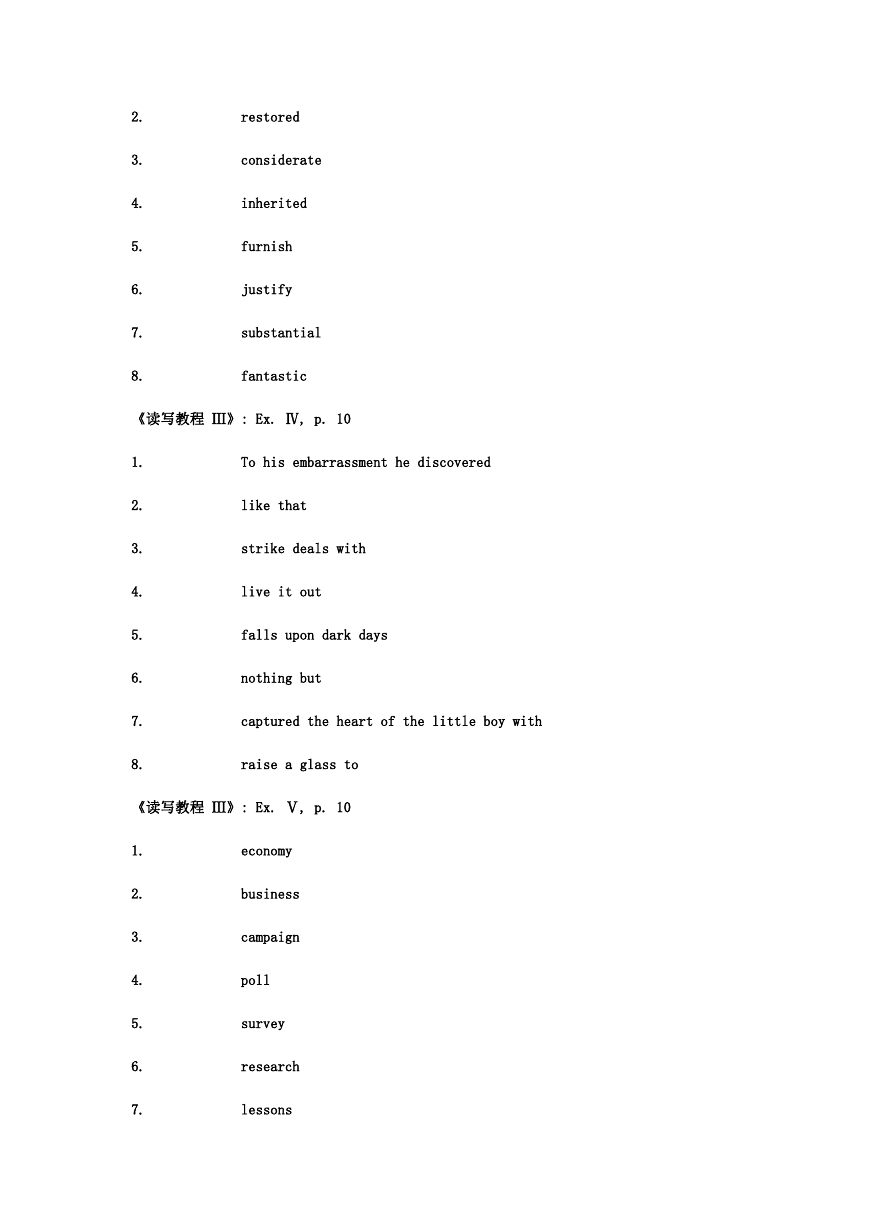
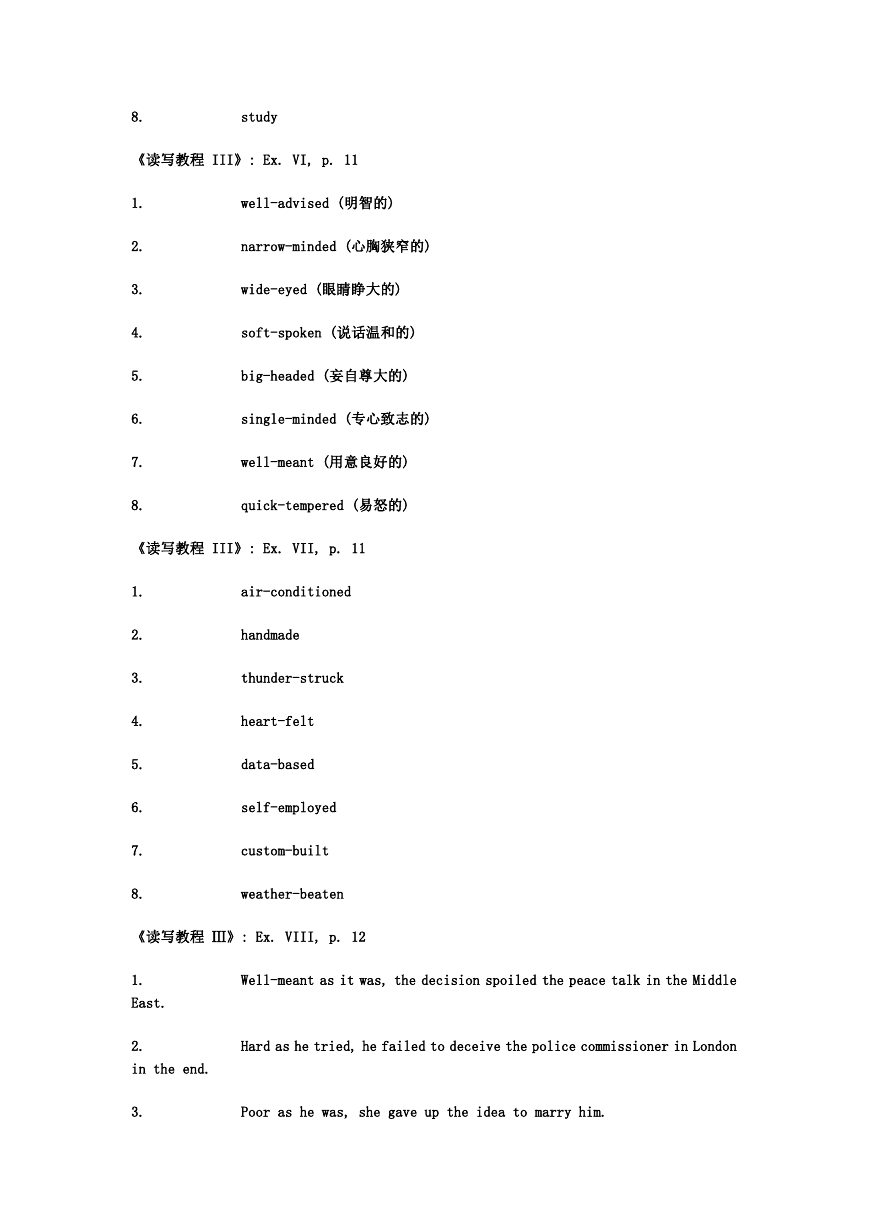
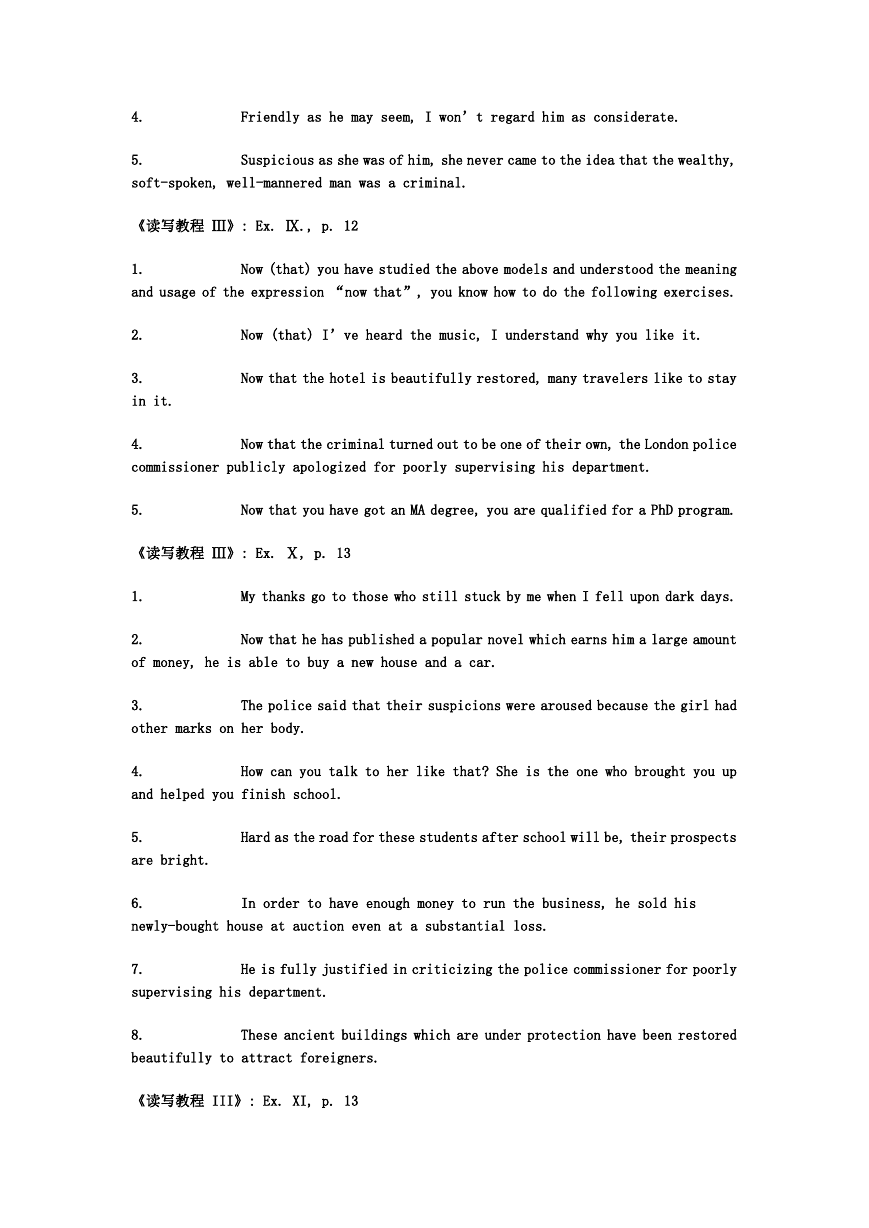
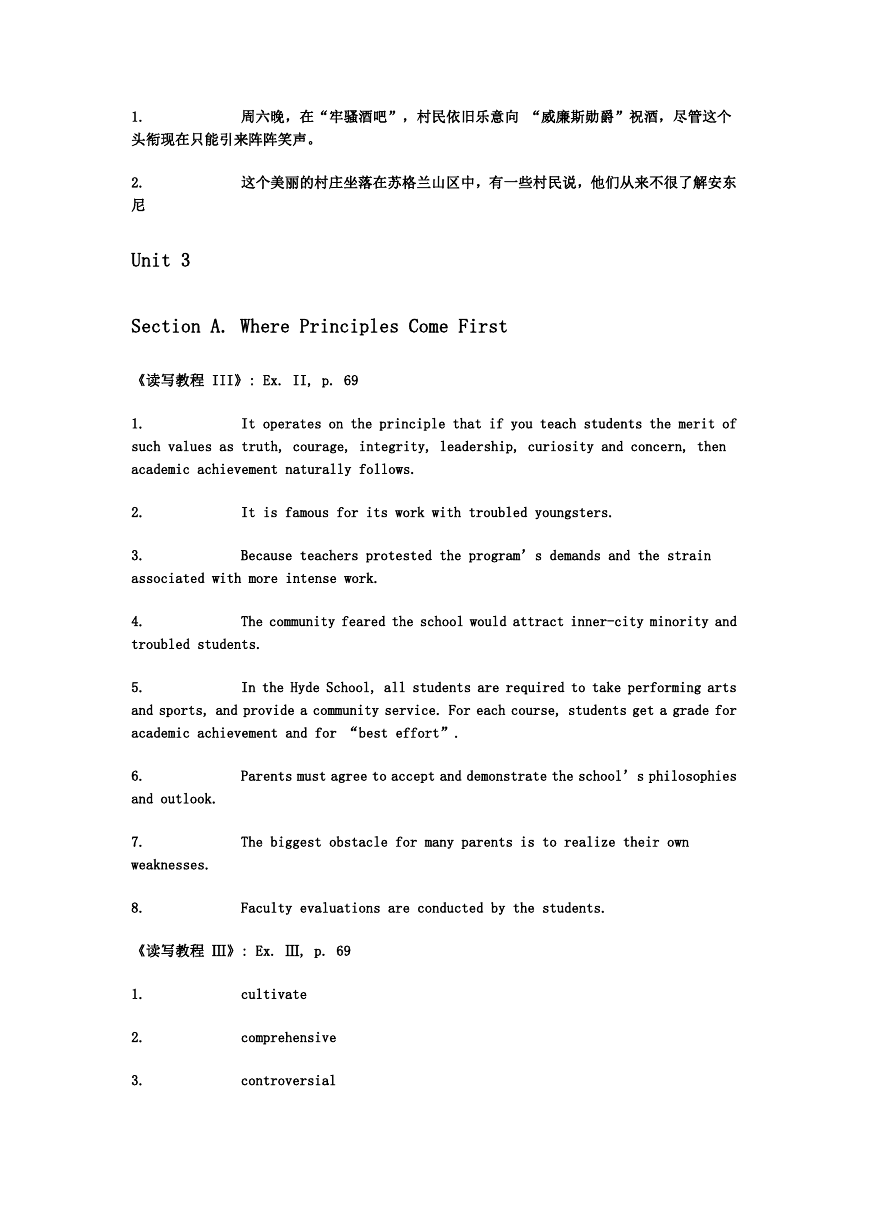
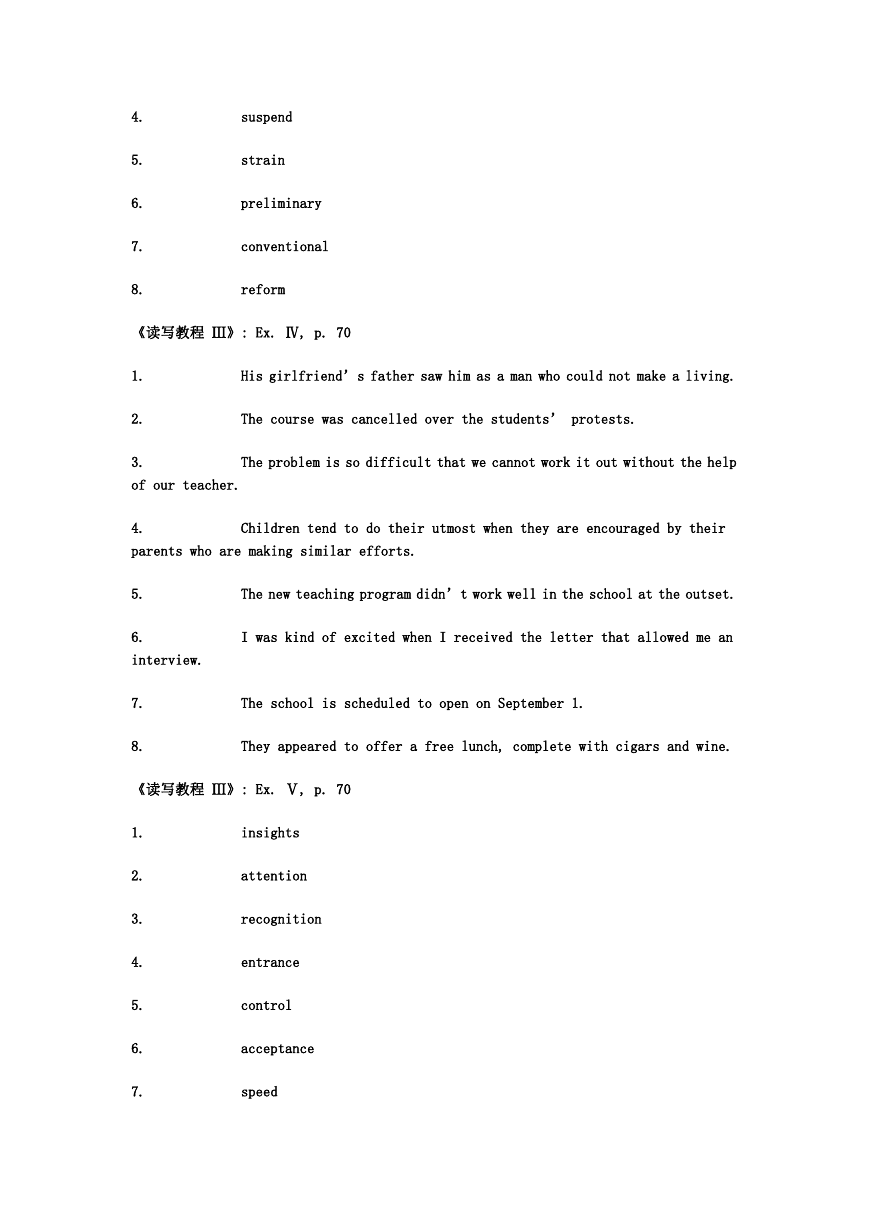

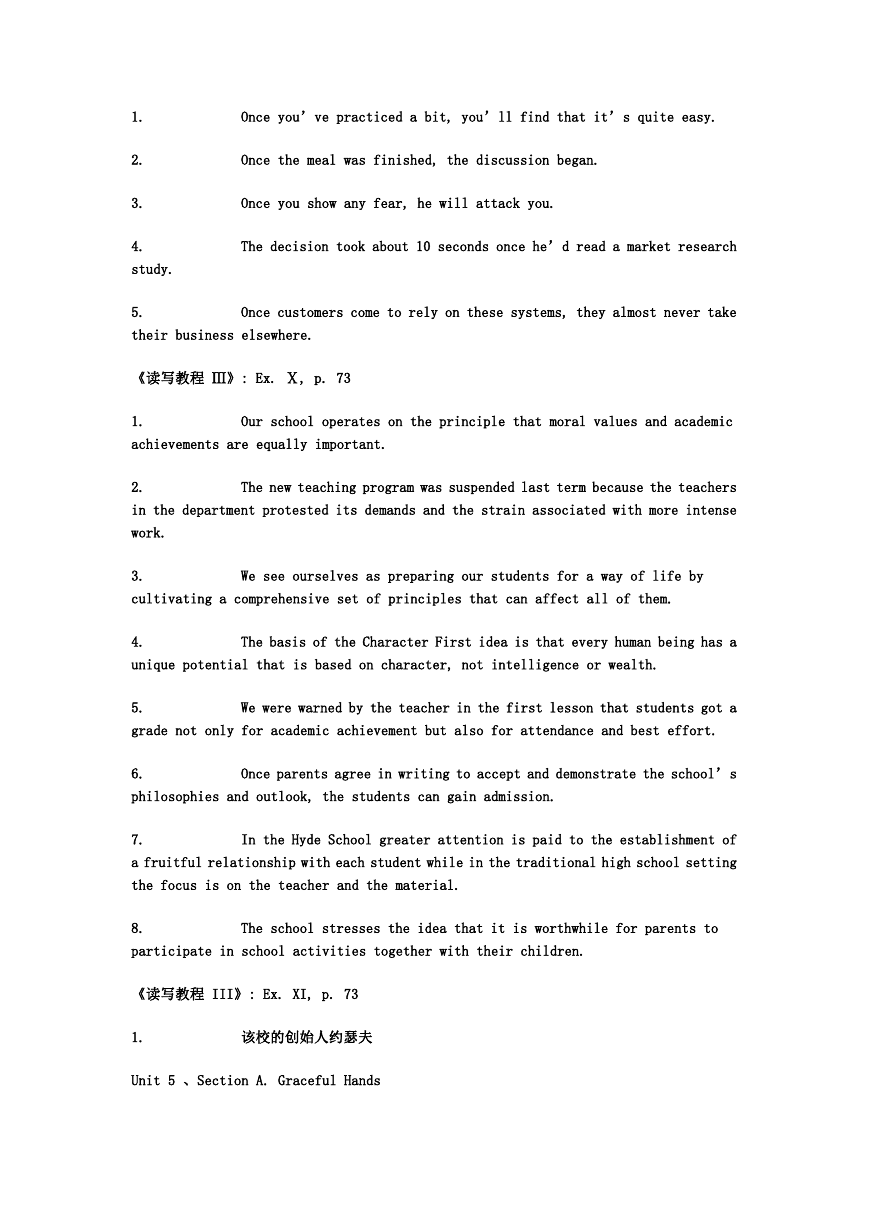








 2023年江西萍乡中考道德与法治真题及答案.doc
2023年江西萍乡中考道德与法治真题及答案.doc 2012年重庆南川中考生物真题及答案.doc
2012年重庆南川中考生物真题及答案.doc 2013年江西师范大学地理学综合及文艺理论基础考研真题.doc
2013年江西师范大学地理学综合及文艺理论基础考研真题.doc 2020年四川甘孜小升初语文真题及答案I卷.doc
2020年四川甘孜小升初语文真题及答案I卷.doc 2020年注册岩土工程师专业基础考试真题及答案.doc
2020年注册岩土工程师专业基础考试真题及答案.doc 2023-2024学年福建省厦门市九年级上学期数学月考试题及答案.doc
2023-2024学年福建省厦门市九年级上学期数学月考试题及答案.doc 2021-2022学年辽宁省沈阳市大东区九年级上学期语文期末试题及答案.doc
2021-2022学年辽宁省沈阳市大东区九年级上学期语文期末试题及答案.doc 2022-2023学年北京东城区初三第一学期物理期末试卷及答案.doc
2022-2023学年北京东城区初三第一学期物理期末试卷及答案.doc 2018上半年江西教师资格初中地理学科知识与教学能力真题及答案.doc
2018上半年江西教师资格初中地理学科知识与教学能力真题及答案.doc 2012年河北国家公务员申论考试真题及答案-省级.doc
2012年河北国家公务员申论考试真题及答案-省级.doc 2020-2021学年江苏省扬州市江都区邵樊片九年级上学期数学第一次质量检测试题及答案.doc
2020-2021学年江苏省扬州市江都区邵樊片九年级上学期数学第一次质量检测试题及答案.doc 2022下半年黑龙江教师资格证中学综合素质真题及答案.doc
2022下半年黑龙江教师资格证中学综合素质真题及答案.doc